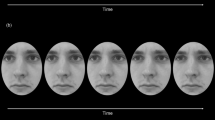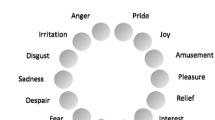Abstract
Though written extensively, recent debates on universality of emotions have shown that age, gender, and ethnicity have greater implications in the ability to identify expressions from faces. Facial emotion recognition deficits have been consistently shown in psychiatric conditions, which necessitates the need to construct a culturally sensitive tool. Fourteen actors depicted emotions such as happy, sad, anger, fear, surprise, disgust, and neutrality. From a total of 126 images, participants rated in terms of intensity and accuracy. Final software was developed with 28 images, and mean accuracy and reaction time were obtained. Friedman’s significance test revealed a significant effect of emotion on its different dimensions. This study helped establish a culturally sensitive emotion recognition tool with the Indian population, which can be used in mental health settings for screening purposes and aid in developing rehabilitation modules.


Similar content being viewed by others
Code Availability
Software code is not available for publication.
References
Anderson, A., & Phelps, E. (2000). Expression without recognition: Contributions of the human amygdala to emotional communication. Psychological Science, 11(2), 106–111.
Behere, R., Raghunandan, V., Venkatasubramanian, G., Subbakrishna, D., Jayakumar, P., & Gangadhar, B. (2008). Trends: A tool for recognition of emotions in neuropsychiatric disorders. Indian Journal Psychological Medicine, 30(1), 32. https://doi.org/10.4103/0253-7176.43132.
Behere, R. V. (2015). Facial emotion recognition deficits: The new face of Schizophrenia. Indian Journal of Psychiatry, 57(3), 229–235. https://doi.org/10.4103/0019-5545.166641.
Biehl, M., Matsumoto, D., Ekman, P., Hearn, V., Heider, K., Kudoh, T., et al. (1997). Matsumoto And Ekman’s Japanese and caucasian facial expressions of emotion (JACFEE): Reliability data and cross-national differences. Journal of Nonverbal Behavior, 21(1), 3–21.
Bowers, D., Bauer, R. M., Coslett, H. B., & Heilman, K. M. (1985). Processing of faces by patients with unilateral hemisphere lesions: I. Dissociation between judgments of facial affect and facial identity. Brain and cognition, 4(3), 258–272.
Carpenter, M., Bauer, T. & Erdogen, B. (2010). Principles of management: Different types of communication. Retrieved from https://catalog.flatworldknowledge.com/bookhub/5?e=carpenter-ch12_s03.
Carter, C., Barch, D. M., Gur, R., Pinkham, A., & Ochsner, K. (2009). CNTRICS final task selection: Social cognitive and affective neuroscience—based measures. Schizophrenia Bulletin, 25(1), 153–162.
Du, S., Tao, Y., & Martinez, A. (2014). Compound facial expressions of emotion. Proceedings of the National Academy of Sciences, 111(15), E1454–E1462. https://doi.org/10.1073/pnas.1322355111.
Ebner, N., & Johnson, M. (2009). Young and older emotional faces: Are there age group differences in expression identification and memory? Emotion, 9(3), 329–339. https://doi.org/10.1037/a0015179.
Ebner, N., He, Y., & Johnson, M. (2011). Age and emotion affect how we look at a face: Visual scan patterns differ for own-age versus other-age emotional faces. Cognition and Emotion, 25(6), 983–997. https://doi.org/10.1080/02699931.2010.540817.
Ekman, P. (1970). Universal facial expressions of emotion (pp. 151–158). California: California Mental Health Digest.
Ekman, P. (1972). Universals and cultural differences in facial expressions of emotion. Nebraska Symposium on Motivation, 19, 207–282.
Ekman, P. (2009). Darwin's contributions to our understanding of emotional expressions. The Royal Society Publishing, 364(1535), 3449–3451. https://doi.org/10.1098/rstb.2009.01.
Ekman, P., Frisen, W., O'Sullivan, M., Chan, A., Pitcairn, T., Tornita, M., et al. (1987). Universals and cultural differences in the judgments of facial expressions of emotion. Journal Of Personality And Social Psychology, 53(4), 712–717.
Ekman, P., Frisen, W., & Tomkins, S. (1971). Facial affect scoring technique: A first validity study. Semiotica. https://doi.org/10.1515/semi.1971.3.1.37.
Elfenbein, H. A., & Ambady, N. (2003). Universals and cultural differences in recognizing emotions. Current Directions in Psychological Science, 12(5), 159–164. https://doi.org/10.1111/1467-8721.01252.
Erwin, R. J., Gur, R. C., Gur, R. E., Skolnick, B., Mawhinney-Hee, M., & Smailis, J. (1992). Facial emotion discrimination: Task construction and behavioural findings in normal subjects. Psychiatry Research, 42, 231–240.
Goeleven, E., De Raedt, R., Leyman, L., & Verschuere, B. (2008). The Karolinska directed emotional faces: A validation study. Cognition and Emotion, 22(6), 1094–1118. https://doi.org/10.1080/02699930701626582.
Goldberg, D. (1978). Manual of the general health questionnaire. NFER-Nelson, Windsor.
Grosbras, M. H., & Paus, T. (2006). Brain networks involved in viewing angry hands or faces. Cerebral Cortex, 16(8), 1087–1096.
Hampson, E., Anders, S. M., & Mullin, L. I. (2006). A female advantage in the recognition of emotional facial expressions: Test of an evolutionary hypothesis. Evolution and Human Behavior, 27, 401–416.
Horning, S.M. (2009). The recognition of facial expressions: An investigation of the influence of age, sex and cognition (Doctoral Dissertation, Colorado State University). Retrieved from https://dspace.library.colostate.edu/bitstream/handle/10976/45/ETD_2011_PHPG_Horning.pdf?sequence=1.
Jackson, C. (2006). The general health questionnaire. Occupational Medicine, 57(1), 79–79. https://doi.org/10.1093/occmed/kql169.
Keltner, D., & Ekman, P. (2000). Handbook of emotions (pp. 236–249). New York: Guilford Publications Inc.
Kessler, H., Bayerl, P., & Deighton, R. (2002). Facially expressed emotion labeling (FEEL): PC-gestützter Test zurEmotionserkennung. Behavioral Therapy And CMHC, 23(3), 297–306.
Killgore, W., & OkiYurgelun-Todd, M. D. (2001). Sex specific developmental changes in amygdala responses to affective faces. NeuroReport, 12(2), 427–433.
Lawrence, K., Campbell, R., & Skuse, D. (2015). Age, gender, and puberty influence the development of facial emotion recognition. Frontiers In Psychology. https://doi.org/10.3389/fpsyg.2015.00761.
Leppanen, J. M., & Hietanen, J. K. (2004). Positive facial expressions are recognized faster than negative facial expressions, but why? Psychological Research PsychologischeForschung, 69(1–2), 22–29. https://doi.org/10.1007/s00426-003-0157-2.
Limbrecht, K., Rukavina, S., Walter, S., & Traue, H. (2012). On the test-retest reliability of facial emotion recognition with the pictures of facial affect-Ulm. GSTF International Journal Of Law And Social Sciences, 1(2), 19–22. https://doi.org/10.5176/2251-2853_1.2.30.
Mandal, M. K. (1987). Decoding of facial emotions in terms of expressiveness by schizophrenics and depressives. Psychiatry, 50(4), 371–376.
Palermo, R., & Coltheart, M. (2004). Photographs of facial expression: Accuracy, response times, and ratings of intensity. Behavior Research Methods, Instruments, and Computers, 36(4), 634–638. https://doi.org/10.3758/bf03206544.
Porter, S., & Brinke, L. (2008). Reading between the lies: Identifying concealed and falsified emotions in universal facial expressions. Psychological Science, 19(5), 508–514.
Schmitz, A. (2012). A primer on communication studies. Retrieved from https://2012books.lardbucket.org/books/a-primer-on-communication-studies/s04-nonverbal-communication.html.
Somerville, L., Fani, N., & McClure-Tone, E. (2011). Behavioral and neural representation of emotional facial expressions across the lifespan. Developmental Neuropsychology, 36(4), 408–428. https://doi.org/10.1080/87565641.2010.549865.
Thomas, L., De Bellis, M., Graham, R., & LaBar, K. (2007). Development of emotional facial recognition in late childhood and adolescence. Developmental Science, 10(5), 547–558. https://doi.org/10.1111/j.1467-7687.2007.00614.x.
Tomkins, S. S., & McCarter, R. (1964). What and where are the primary affects? Some evidence for a theory. Perceptual and motor skills, 18(1), 119–158.
Vaish, A., Grossmann, T., & Woodward, A. (2008). Not all emotions are created equal: The negativity bias in social-emotional development. Psychological Bulletin, 134(3), 383–403. https://doi.org/10.1037/0033-2909.134.3.383.
Author information
Authors and Affiliations
Corresponding author
Ethics declarations
Conflict of interest
No conflict of interest.
Ethics Approval
Study was approved by departmental panel instituted by Christ (Deemed to be University) in accordance with ethical guidelines.
Consent to Participate
Informed consent to participate in research was obtained by participants (see below).
Consent to Participate in Research
You are being asked to participate in a research study conducted by Karishma Rajan Menon from the Department of Psychology at Christ University, Bangalore. The results of this study will be used to fulfil the requirements of a research project/dissertation for the degree of Masters of Science in Clinical Psychology. You were selected as a possible participant in this study because you fill the criteria of being an individual between the age ranges of 18 and 35 with no prior history of any psychiatric illness.
Purpose of the Study
The aim of the research is to develop and validate an emotion recognition software in the Indian population to screen for deficits in identifying facial emotions.
Procedures
You must be between the ages of 18 and 35 years. You must also be of Indian ancestry because the software is being validated in the specific culture. Language is no barrier. If you decide to participate in the study, you will be expected to fill out a questionnaire regarding your general health and also respond to the software.
Potential Benefits to Participants and/or to Society
No remuneration or monetary benefits would be given for the study. The participants will not receive any benefits from the study. After the completion of the research with your participation, the software will be published to be of use in mental health settings to screen individuals with deficits in recognizing emotions from faces. It will aid in diagnosis as well as therapy/counselling purposes.
Confidentiality
Individual’s demographic information that is obtained in connection with this study and that can be identified with you will remain confidential and will be disclosed only with your permission.
Participation and Withdrawal
You can choose whether to be in this study or not. If you volunteer to be in this study, you may withdraw at any time without consequences of any kind. The investigator may withdraw you from this research if circumstances arise which warrant doing so.
Rights of Research Participants
You may withdraw your consent at any time and discontinue participation without penalty. You are not waiving any legal claims, rights or remedies because of your participation in this research study. I understand the procedures described above. My questions have been answered to my satisfaction, and I agree to participate in this study.
Consent for Publication
Consent for use of study materials for research purposes and publication of software was obtained from participants. After the completion of the research with your participation, an academic paper and software will be published to be of use in mental health settings to screen individuals with deficits in recognizing emotions from faces. It will aid in diagnosis as well as therapy/counselling purposes.
Availability of Data and Material
Data set is not available for publication. Authors may be contacted for possible use of software for future research.
Additional information
Publisher's Note
Springer Nature remains neutral with regard to jurisdictional claims in published maps and institutional affiliations.
Rights and permissions
About this article
Cite this article
Rajan Menon, K., Malu, B. & Sinha, C. Development and Validation of Emotion Recognition Software in the Indian Population. Psychol Stud 65, 489–496 (2020). https://doi.org/10.1007/s12646-020-00574-8
Received:
Accepted:
Published:
Issue Date:
DOI: https://doi.org/10.1007/s12646-020-00574-8




